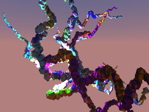Reading on: Origin of the concept of emergence
Golden, Richard Self-Organizing Systems: a resource for teachers 1997 [770 words] — origin of the concept of emergence
“The thing that hath been is that which shall be; and that which is done is that which shall be done: and there is no new thing under the Sun.” Ecclesiastes
This cyclical worldview of the ancients was a natural extension of the observations of seasonal change and of decay and regeneration. It was the dominant view in a world in which change was hard to recognize in an individual lifetime. In such a world there is no progress.
A philosopher of the ancient world who did see change as part of existence was the historian Heraclitus (533-475 BC). His maxim was, “You cannot step twice into the same river; for fresh waters are ever flowing in upon you.” For him everything was becoming.
The idea that change can bring new things into the world was not the common point of view until the way was prepared by the acceptance of Darwin’s theory of evolution. If evolution could, in time, bring new species into being it was imaginable that the developing processes of the world had produced new and unexpected arrangements of all kinds.
The first use of the word “emergent” to refer to phenomena that were new and not explicable by the properties of their components was by George Henry Lewes (1817-1878). In his book Problems of Life and Mind (1879). Lewes contrasts the word “emergent” with the word “resultant” and introduces the idea that it is through emergence that novelties enter the world. He wrote that an emergent effect is not additive, not predictable from knowledge of its components, and not decomposable into those components.
An
early attempt to establish a philosophic interpretation of nature
as a whole with emergence as one of its guiding principles is the
work of Samuel Alexander (1859-1938). Early on he accepted and incorporated
the idea of Minkowski and Einstein that space and time were not
independent, that the only reality was space-time. In Space,
Time, and Deity (1920)he wrote:
“In the course of time new complexity of motions
comes into existence, a new quality emerges, that is, a new complex
entity possesses as a matter of observed empirical fact a new or
emergent quality... Physical and chemical processes of a certain
complexity have the quality of life... The higher quality emerges
from the lower level of existence and has its roots therein, but
it emerges therefrom, and it... constitutes a new order of existence
with its special laws of behaviour… Mind is, according to our
interpretation of the facts, an ‘emergent’ from life.”
In Samuel Alexander’s view, there were two fundamental concepts in the understanding of the universe. They were space-time and the tendency of matter to move toward increasing complexity with new qualities, or properties, emerging. This idea is at the heart of the concept of emergence.
A contemporary of Alexander, C. Lloyd Morgan (1852-1936), in Emergent Evolution (1928) expanded on the idea of emergence. He saw at each step of increasing complexity of matter new relationships forming; new ways of acting and reacting, new properties appearing. New because “their specific nature could not be predicted before they appear in the evidence.” For an illustration he used the phase change of water to ice. In Morgan’s view the lower density of ice compared to that of water represents a new relationship among the water molecules. As ice they are in a crystalline relationship vastly different from their relationship to each other as liquid. The phase change brings new emergent properties like solidity along with it.
There is a growing consensus among scientists that high energy particle physics and its rational, reductionism, will not reveal what we really want to know about the universe. It given us much knowledge but will not tell us how complexity and order emerged from the featurelessness and chaos of the big bang. A new approach to scientific research is in the offing. Some of its concepts include self-organization, organizing principles, spontaneous order, nonlinear systems and, something that as yet has no agreed name, the opposite of entropy.
Emergents are those organizations of matter or processes that result from the synergetic combination of simple systems into more complex ones. Characterized by the phrase, “the whole is greater than the sum of its parts.”
Emergent properties are those novel ways of acting that come into being with the increase in organizational complexity of systems. They are constructions of a whole system and do not belong to the component parts of the system. Emergent properties are collectives that can disappear when the communicating relationship within the system is disrupted.
The cell is an emergent from the background of inanimate matter and brings into being the new property called life. Progress in the world is by means of emergents and their properties.


